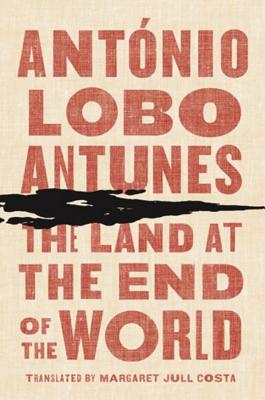Thoughts on books, reading and publishing from the staff and friends of the Tattered Cover Book Store.
Monday, May 23, 2011
Dispatches From The Field: Joe Says This Book Is "visceral, sensual, and violent "
Considered to be Antonio Lobo Antunes's masterpiece, The Land at the End of the World--now in a new and fully restored translation by acclaimed translator Margaret Jull Costa--recounts the anguished tale of a Portuguese medic haunted by memories of war, who, like the Ancient Mariner, will tell his tale to anyone who listens. In the tradition of William Faulkner and Gabriel Garcia Marquez, Lobo Antunes weaves words into an exhilarating tapestry, imbuing his prose with the grace and resonance of poetry. The narrator, freshly returned to Lisbon after his hellish tour of duty in Angola, confesses the traumas of his memory to a nameless lover. Their evening unfolds like a fever dream, as Lobo Antunes leaps deftly back and forth from descriptions of postdictatorship Portugal to the bizarre and brutal world of life on the front line. The result is both tragic and absurd, and belongs among the great war novels of the modern age.
Learn more about Antunes and his fascinating background.
Joe says:
"Dear Reader, please, sit down. May I offer you a glass of cognac? Perhaps a whisky? Sit down, now, and let yourself get carried away by Lobo Antunes' The Land At The End Of The World. The narrator, a Lisbon doctor drafted into the Portuguese army to aid those aiming to squelch the Angola war of independence, tells his monologue to a woman he meets in a bar one late evening in Lisbon. The doctor has witnessed the utter futility of war, the constant presence of blood and death and fear. He has missed his homeland that he now despises. He has despised himself, his leaders, the war and most human desires. He lives an existence that begins late in the day in a bar and ends in the cold embrace of lovemaking with a stranger. He exists plagued by the bony-fingered shadow of a war without purpose. He is a man, who having participated in such a war, can no longer participate in the society for which it was supposedly fought.
The action of the book takes place over the course of one night, but steeped in the weight of the narrator's memories. After each chapter, I emerged, as if from a dream, rising up from the waters to catch my breath, before slipping back into the world Lobo Antunes creates with his words. The poetry of this book is unlike many other books I have read. At times, the narrator's images, metaphors, similes rise up, coiling each of my limbs, pulling them in a different direction, only to find myself sitting in the bar beside the narrator as he proffers me another drink. And I gladly take that drink and let myself be led back into the fantastic world in which he describes his, and I realize, my own, state.
The Land At The End Of The World is not a book to quickly read and easily forget. It's a visceral, sensual, and violent book, that lingers after its completion. It's a book that I want others to read so we can sit down with drinks in a lush and stale bar and talk of the futility of war, the death in sex, the hate in love."
Subscribe to:
Post Comments (Atom)


No comments:
Post a Comment